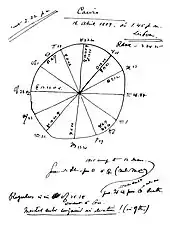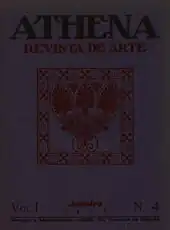
Alberto Caeiro is a heteronym which the Portuguese poet Fernando Pessoa began to use in 1914 and introduced in print in 1925. In his fictional biography, Caeiro was born in Lisbon on 16 April 1889, lived most his life in a village in Ribatejo and died in 1915. He was the leader and teacher of a group of neopagan poets and intellectuals that included Pessoa's other heteronyms António Mora, Ricardo Reis and Álvaro de Campos.
Caeiro was the first of Pessoa's major heteronyms. The first and most famous work Pessoa composed under this name was The Keeper of Sheep, a series of 49 poems he began in 1914 and continued to edit until his death in 1935. The rest of Caeiro's poems are grouped under the headings The Shepherd in Love and Uncollected Poems.
Development
Fernando Pessoa (1888–1935) was a Portuguese poet who posthumously became highly regarded in European literature.[1] Alberto Caeiro was the first of his major heteronyms, a term he used for three of his over a hundred pen names.[2] According to a letter Pessoa wrote to the literary critic Adolfo Casais Monteiro, he created Caeiro on 8 March 1914 when he wrote a series of poems that would become The Keeper of Sheep.[3]

The first time any material was published under Caeiro's name was in January 1925, when 23 poems from The Keeper of Sheep appeared in issue 4 of Athena: Revista de Arta,[4] a literary journal edited by Pessoa together with Ruy Vaz.[5] Some of the Uncollected Poems were published in Athena no. 5. Further material appeared in Presença in 1931. Pessoa continued to revise the poems throughout his life and some of them exist in many variants.[3]
Eduardo Lourenço stressed the influence from Walt Whitman in a 1977 essay, "Walt Whitman e Pessoa" (lit. 'Walt Whitman and Pessoa'"), where he arged that the heteronyms Caeiro and Álvaro de Campos emerged through an "explosion of Pessoa's universe when confronted with Whitman's universe".[6] Lourenço distinguished Campos, where the influence from Whitman is more direct, from Caeiro, where it is suppressed.[7] In a text uncovered after Lourenço wrote his essay, Pessoa commented, under his English-language heteronym Thomas Crosse, on the similarities between Caeiro and Whitman, arguing that Caeiro was a superior poet and that there was no influence from Whitman. Based partially on Pessoa's assertive denial, the scholar Richard Zenith argues that the influence from Whitman was considerable.[8]
Life and views
Alberto Caeiro | |
|---|---|
| Born | 16 April 1889 Lisbon, Portugal |
| Died | 1915 (aged 25–26) Lisbon, Portugal |
| Signature | |
In the fictional biography Pessoa created for Caeiro, the poet was born in Lisbon, Portugal, on 16 April 1889.[9] In one annotation, his year of birth is instead given as 1887 and he is said to have two suppressed middle names.[10] He lived his first two years in Lisbon, but lived most of his life in a village in the Ribatejo Province, where he wrote the majority of his poems.[11] After staying a few months in Lisbon in 1915, Caeiro died from tuberculosis.[11]
In his poems, Caeiro boasts about being ignorant about literature and having little education.[3] He describes his early poems collected in the The Keeper of Sheep as a child's work.[11] He developed his own poetics based on free verse and a worldview that premiered the immediate experience and rejected attempts to find an underlying truth or meaning in things.[3]
Caeiro was a major character in Pessoa's fictional universe, something Pessoa referred to as ficções do interlúdio (transl. interluding fictions).[3] He functioned as someone who Pessoa's other heteronyms looked up to and Pessoa described Caeiro as his own master.[12] Caeiro was the central figure of the Programa geral do Neo-Paganismo Português (lit. 'General Programme of Portuguese Neo-Paganism'), through which Pessoa's heteronyms sought to explore neopaganism with Caeiro as their starting point.[3] Under the heteronym of António Mora, Pessoa wrote about Caeiro and paganism:
In order for paganism to be reborn, a pagan needed to appear, a man with a pagan mind, who could spontaneously reveal that pagan sensibility for others to adapt and give intellectual form to. We needed to find the insubstantial substance, of paganism, so that others might feel and understand it, and give it its due attributes.
If Destiny wanted that to be so, then it would be. And Destiny did.
Alberto Caeiro appeared.[13]
Works
Pessoa wrote 104 poems under the Caeiro heteronym. Luís de Montalvor and João Gaspar Simões published the first collection of his poetry, Poemas de Alberto Caeiro, in Portugal in 1946. In Brazil, Maria Aliete Galhoz edited an Obra poetica in 1960.[5] Shearsman Books published Caeiro's poems in full in English interpretations by Chris Daniels in 2007 as The Collected Poems of Alberto Caeiro. Margaret Jull Costa and Patricio Ferrari translated the collected poems and selected texts about Caeiro from Pessoa's other heteronyms for a bilingual edition from New Directions, The Complete Works of Alberto Caeiro, published in 2020. The latter edition is based on a 2016 Portuguese critical edition edited by Ferrari and Jerónimo Pizarro.[14]
The Keeper of Sheep (Portuguese: O Guardador de Rebanhos) is a collection of 49 poems and the most famous of Caeiro's works. The title is attributed to Caeiro, but some of the poems were first included in the collection by the literary critic Maria Aliete Galhoz.[3]
The Shepherd in Love (Portuguese: O Pastor Amoroso) is a shorter sequence of poems. Under the Campos heteronym, Pessoa described it as "a futile interlude, but the few poems it contains are among the world's great love poems".[15]
The Uncollected Poems (Portuguese: Poemas inconjuntos) is a collective name for Caeiro's other poems. According to Pessoa's in-universe writings, the title was created by Ricardo Reis.[15]
Pessoa wrote introductions and critical commentaries to Caeiro's poems under other heteronyms. The first of these was by Mora, a heteronym Pessoa used for theoretical texts about paganism.[13] There are more than 40 texts about Caeiro attributed to Reis, many of them fragmentary and likely intended as parts of prefaces.[15] Campos' "Notes in Remembrance of My Master Caeiro" was published in Presença in 1931.[16] Pessoa prepared material for promoting Caira's works in Europe, writing his own reviews and an English-language introduction under the name I. I. Crosse.[17]
Reception

Like with Pessoa's literary output in general, only a small portion of Caeiro's poetry was published in Pessoa's lifetime, and it took decades before it received significant recognition.[17] Several works with a focus on Caeiro have been published since the Poemas de Alberto Caeiro appeared in 1946.[5] Ivo Castro wrote a work on Caeiro in 1986 and published the first critical edition of his poems in 2015.[5]
Selected bibliography
- Pessoa, Fernando (2007). The Collected Poems of Alberto Caeiro. Translated by Daniels, Chris. Exeter: Shearsman Books. ISBN 978-1-905700-24-0.
- Pessoa, Fernando (2020). Pizarro, Jerónimo; Ferrari, Patricio (eds.). The Complete Works of Alberto Caeiro. Translated by Jull Costa, Margaret; Ferrari, Patricio. New York City: New Directions. ISBN 978-0-8112-2780-3.
References
Citations
- ↑ Monteiro 2000, pp. 1–2.
- ↑ Pizarro 2017, p. 56.
- 1 2 3 4 5 6 7 Pizarro & Ferrari 2020a.
- ↑ Monteiro 2000, p. xxi; Pizarro & Ferrari 2020a.
- 1 2 3 4 Pizarro 2017, p. 59.
- ↑ Zenith 2013, p. 40.
- ↑ Zenith 2013, pp. 40–41.
- ↑ Zenith 2013, pp. 42–43.
- ↑ Pizarro 2017, p. 60.
- ↑ Pizarro 2017, p. 58.
- 1 2 3 Pizarro 2017, p. 61.
- ↑ Jull Costa 2020.
- 1 2 Pizarro & Ferrari 2020b.
- ↑ Mahler 2021, p. 453.
- 1 2 3 Pizarro & Ferrari 2020c.
- ↑ Pizarro & Ferrari 2020d.
- 1 2 Mahler 2021, p. 454.
Sources
- Dix, Steffen (2005). Heteronymie und Neopaganismus bei Fernando Pessoa [Heteronymy and Neopaganism in Fernando Pessoa] (in German). Würzburg: Königshausen & Neumann. ISBN 3-8260-3039-7.
- Jull Costa, Margaret (2020). "A biographical note". In Pizarro, Jerónimo; Ferrari, Patricio (eds.). The Complete Works of Alberto Caeiro. New York City: New Directions. ISBN 978-0-8112-2780-3.
- Mahler, Adam (2021). "The astonishing materiality of things: On a new translation of the works of Alberto Caeiro". Pessoa Plural. 20. doi:10.26300/qm22-z758.
- Monteiro, George (2000). Fernando Pessoa and Nineteenth-Century Anglo-American Literature. Lexington: University of Kentucky Press. ISBN 978-0-8131-2182-6.
- Pizarro, Jerónimo (2017). "How to Construct a Master: Pessoa and Caeiro". Portuguese Studies. 33 (1): 56–69. doi:10.5699/portstudies.33.1.0056. ISSN 0267-5315. JSTOR 10.5699/portstudies.33.1.0056. S2CID 165017688.
- Pizarro, Jerónimo; Ferrari, Patricio (2020a). "Introduction". In Pizarro, Jerónimo; Ferrari, Patricio (eds.). The Complete Works of Alberto Caeiro. New York City: New Directions. ISBN 978-0-8112-2780-3.
- Pizarro, Jerónimo; Ferrari, Patricio, eds. (2020b). "Text by António Mora". The Complete Works of Alberto Caeiro. New York City: New Directions. ISBN 978-0-8112-2780-3.
- Pizarro, Jerónimo; Ferrari, Patricio, eds. (2020c). "Texts by Álvaro de Campos". The Complete Works of Alberto Caeiro. New York City: New Directions. ISBN 978-0-8112-2780-3.
- Pizarro, Jerónimo; Ferrari, Patricio, eds. (2020d). "Texts by Ricardo Reis". The Complete Works of Alberto Caeiro. New York City: New Directions. ISBN 978-0-8112-2780-3.
- Zenith, Richard (2013). "Pessoa and Walt Whitman Revisited". In Gray de Castro, Mariana (ed.). Fernando Pessoa's Modernity Without Frontiers: Influences, Dialogues, Responses. Woodbridge: Tamesis. ISBN 978-1-85566-256-8.
Further reading
- Brown, Susan Margaret (1987). The Poetics of Pessoa's Drama em Gente: The Function of Alberto Caeiro and the Role of Walt Whitman (PhD). University of North Carolina at Chapel Hill.
- Dix, Steffen (2010). "The Plurality of Gods and Man, or 'The Aesthetic Attitude in All Its Pagan Splendor' in Fernando Pessoa". The Pluralist. 5 (1): 73–93. doi:10.1353/plu.0.0044. S2CID 146526978.
- Ryan, Bartholomew (2017). "A Voyage in Immanence: Alberto Caeiro as an Expression of Spinoza's Ethics". In Swenson, Brynnar (ed.). Literature and the Encounter with Immanence. Leiden: Brill. pp. 153–177. doi:10.1163/9789004311930_010. ISBN 978-90-04-31192-3.
- Sheets, Jane M. (1969). "Fernando Pessoa as Anti-Poet: Alberto Caeiro". Bulletin of Hispanic Studies. 46 (1): 39–47. doi:10.1080/1475382692000346039.
External links
 Portuguese Wikisource has original text related to this article: Autor:Alberto Caeiro (in Portuguese)
Portuguese Wikisource has original text related to this article: Autor:Alberto Caeiro (in Portuguese)